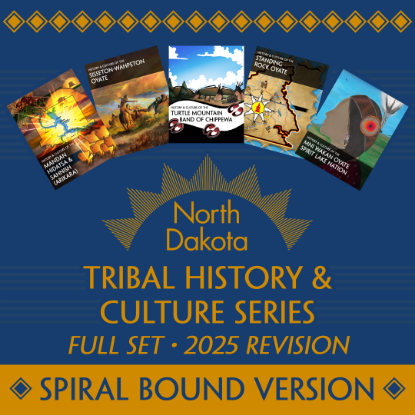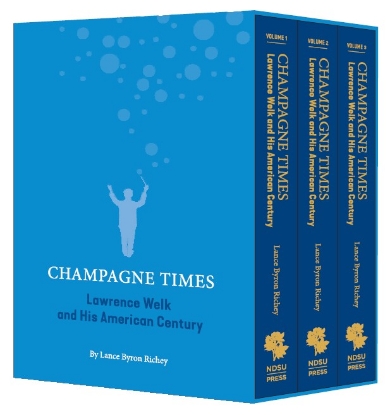Nonfiction
Tribal History & Culture Series Spiral-bound Set
AVAILABLE NOW FOR PRESALE TO TAX EXEMPT CUSTOMERS ONLY.
Our copyeditors, designers, and marketing teams are working with this project during our summer 2025 season with an anticipated late fall 2025 to early spring 2026 delivery date. We are happy to take presale orders in the meantime, and we will fill your order as soon as copies are available. At this time, the textbooks are available only as complete sets.
The North Dakota Tribal History & Culture book series teaches students about the Indigenous nations that share geography with the state. The goal of the series is for North Dakotans from these nations to explain their cultures in their own words. The books are written by experts, scholars, and Elders from each nation, with review by the North Dakota Tribal College System. The provided content is distributed by the North Dakota Department of Public Instruction, North Dakota State University Press, and North Dakota Tribal College System. The original books were released from 1995-2002, with the current revised edition released in 2026. The books are used in the 8th grade and high school North Dakota Studies classes, as well as in higher education. The revision was prompted by the passage of North Dakota Senate Bill 2304 in 2021, which mandates that all elementary and secondary public and nonpublic schools include Native American history and culture in their curriculums.
The titles in this five-volume set are:
- History & Culture of the Mandan, Hidatsa, & Sahnish (Arikara)
- History & Culture of the Mni Wakan Oyate Spirit Lake Nation
- History & Culture of the Sisseton-Wahpeton Oyate
- History & Culture of the Standing Rock Oyate
- History & Culture of the Turtle Mountain Band of Chippewa
The Sisseton Wahpeton Oyate nation (Dakota: Sisíthuŋwaŋ Waȟpéthuŋwaŋ Oyáte) also shares geography with North Dakota. However, the original four History & Culture books did not include a fifth book for Sisseton Wahpeton because Agency Village, its capitol, is outside the state. In North Dakota, the general vicinity around the Lake Traverse Indian Reservation is referred to as "South Dakota."
Printing for this project takes place at the United Tribes Technical College (spiral bound) and Sisseton-Wahpeton Oyate College (paperback).
Champagne Times: Lawrence Welk and His American Century
Over seventy years after his debut on KTLA in Los Angeles, and nearly decades after his debut on ABC in 1955, Lawrence Welk's unprecedented and almost continuous run on network, syndicated, and now public television confirms his place in American entertainment history. From his childhood in a small, German-speaking immigrant community on the North Dakota plains to one of the richest and most recognizable entertainers of his generation, Lawrence's story is a microcosm of the national experience during the American Century.
By telling his story, author Lance Byron Richey came to understand the experience of assimilation and secularization, war and peace, and Depression and prosperity that his generation of Americans lived through in the twentieth century. In the process, the supposedly traditional and timeless values Lawrence mythologized for his audience were revealed as just as time-bound and transient as those of the Baby Boomer generation that supplanted him and his generation as the arbiters of cultural taste.
Most importantly, though, as a man, Richey came to see Lawrence in his moral simplicity and personal complexity, a deeply good and decent man whose family often paid the price for his unquenchable desire for success and security, which his childhood on a North Dakota farm had implanted in him. In short, Welk's story is a quintessentially American story.
The first edition of Champagne Times is limited to five hundred numbered copies, all of which have been signed by the author. The book covers are SKIVERTEX Vellin #5517 blue casing, premium grade, simulated leather material debossed with gold foil. They are designed by Deb Tanner; printed and bound by Thomson Reuters Core Publishing Solutions.
Lance Byron Richey serves as President of the University of Saint Francis in Fort Wayne, Indiana, where he also holds the rank of Professor of Theology. A graduate of Furman University (B.A. in History, 1988) and Conception Seminary College (Certificate of Pre-Theological Studies, 1991), he studied both Philosophy (PhD 1995) and Religious Studies (PhD, 2004) at Marquette University i Milwaukee, Wisconsin; he as published widely in both disciplines. Lance and his wife, Carol, have five children.
LCCN: 2025938196
ISBN: 978-1-946163-76-9
Volume 1: Fire in the Belly (1903-1945), 400 pp., 37 b&w photos
Volume 2: Evening Star (1945-1963), 416 pp., 39 b&w photos
Volume 3: A Rock in the Storm (1964-1992), 424 pp. including 16 color photo pp., 36 b&w photos
Hardcover, packed in slip-case, limited edition, signed and numbered
Publication Year: 2025

























